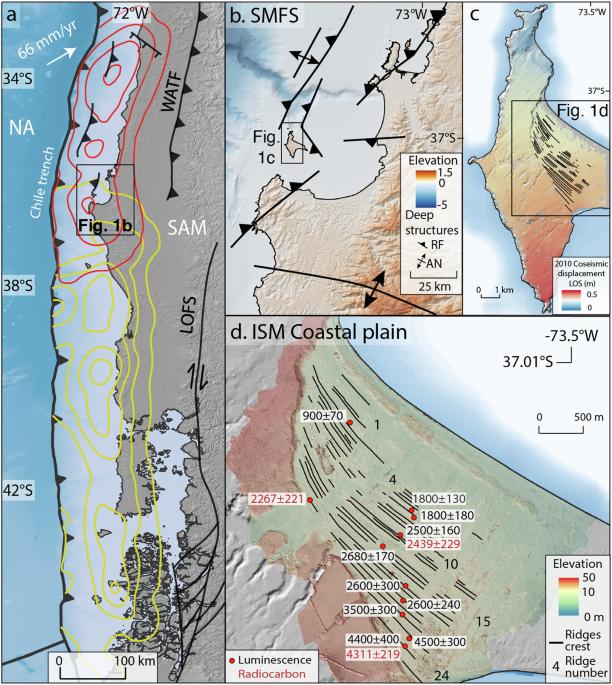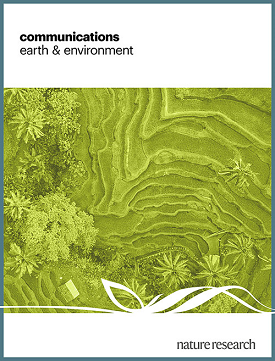智利中南部大地震周期性的构造控制
IF 8.1
1区 地球科学
Q1 ENVIRONMENTAL SCIENCES
引用次数: 0
摘要
特大地壳地震的多年记录凸显了周期性和复发行为的差异。了解造成这些差异的构造过程与断层力学和灾害模型息息相关。在这里,我们展示了从智利中南部 2010 年毛勒地震(Mw 8.8)地段凸起的海滩脊推断出的古地震记录,其中包括 4.5 千年内的 24 次地震间隔,表明了弱周期性的复发行为。而相邻的 1960 年瓦尔迪维亚地震(Mw 9.5)地段的大地震在相同的时间跨度内也发生了周期性重现。这两个地段的海沟沉积厚度以及流变和几何边界条件相似,但莫尔有一个较宽的正面增生楔和扎根于成震区的若干飞溅断层,而瓦尔迪维亚则缺乏飞溅断层,海沟沉积物大多是俯冲和欠倾斜的。这些差异可能会对上板块顺应性和巨岩摩擦力产生影响,从而影响地震规模和重现周期。从智利中南部边缘毛莱地震区段隆起的滩脊推断出的古地震记录显示出弱周期性的复发行为,相比之下,附近瓦尔迪维亚区段的复发周期性较强本文章由计算机程序翻译,如有差异,请以英文原文为准。

Tectonic control on great earthquake periodicity in south-central Chile
Multi-millennial records of great megathrust earthquakes have highlighted differences in periodicity and recurrence behavior. Understanding tectonic processes responsible for these differences is relevant for fault mechanics and hazard models. Here, we present a paleoseismic record inferred from raised beach ridges in the 2010 Maule earthquake (Mw 8.8) segment in south-central Chile that includes 24 interseismic intervals over 4.5 kyr suggesting a weakly-periodic recurrence behavior. In turn, great earthquakes in the adjacent 1960 Valdivia earthquake (Mw 9.5) segment occurred with periodic recurrence over the same time span. Both segments have similar trench sediments thicknesses as well as rheological and geometrical boundary conditions, but Maule has a wider frontal accretionary wedge and several splay faults rooted in the seismogenic zone whereas Valdivia lacks splay faults and trench sediments are mostly subducted and underplated. These differences may have an impact on upper-plate compliance and megathrust friction, affecting earthquake size and recurrence periodicity. A paleoseismic record inferred from raised beach ridges along the Maule earthquake segment of the south-central Chilean margin displays weakly-periodic recurrence behaviour in comparison to strong periodicity over the nearby Valdivia segment
求助全文
通过发布文献求助,成功后即可免费获取论文全文。
去求助
来源期刊

Communications Earth & Environment
Earth and Planetary Sciences-General Earth and Planetary Sciences
CiteScore
8.60
自引率
2.50%
发文量
269
审稿时长
26 weeks
期刊介绍:
Communications Earth & Environment is an open access journal from Nature Portfolio publishing high-quality research, reviews and commentary in all areas of the Earth, environmental and planetary sciences. Research papers published by the journal represent significant advances that bring new insight to a specialized area in Earth science, planetary science or environmental science.
Communications Earth & Environment has a 2-year impact factor of 7.9 (2022 Journal Citation Reports®). Articles published in the journal in 2022 were downloaded 1,412,858 times. Median time from submission to the first editorial decision is 8 days.
 求助内容:
求助内容: 应助结果提醒方式:
应助结果提醒方式:


